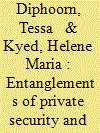|
|
|
Sort Order |
|
|
|
Items / Page
|
|
|
|
|
|
|
| Srl | Item |
| 1 |
ID:
183817


|
|
|
|
|
| Summary/Abstract |
Borderlands and bordering processes are central to politics and the governance of people, goods, and territories, not only as markers of territorial-administrative control but also as practices that shape the dynamics of inclusion and exclusion, mobility/immobility, and relations of power and authority. This special issue focuses on Myanmar, where political governance is deeply entangled with ethnicity, territory, borders, and bordering processes. We attempt to untangle these relationships by adopting an approach that combines consideration of how borderlands are governed with recognition of the ways in which borders, borderlands, and border populations shape governance and administration. We define this approach as ‘border governance’, by which we mean governance in, of, and through borderlands. In this introduction, we explore the meaning and significance of border governance as it relates to Myanmar, its ethnic border states, and their relations to other nations bordering the country. In doing so, we engage with and develop scholarly debates in three primary areas: (i) Borders, territoriality, and bordering processes; (ii) Plural governance and everyday bordering; (iii) Peacebuilding and the borders of transition. The articles in this special issue were written prior to the military coup of February 2021. Nevertheless, the central arguments presented here remain relevant, as does our conclusion: to achieve lasting peace in Myanmar, the borderlands must be at the centre.
|
|
|
|
|
|
|
|
|
|
|
|
|
|
|
|
| 2 |
ID:
147821


|
|
|
|
|
| Summary/Abstract |
Security in Africa is seldom a public good provided by the state, but is frequently something you pay for or acquire by turning to various non-state or community actors. The privatization of security in African cities is reflected in the rapid growth of the private security industry, which is matched by the widespread involvement of civilian actors in neighbourhood watches and self-organized policing groups. Much of the scholarly debate on ‘plural policing’ and ‘security assemblages’ has focused on what the privatization of security means for the state, highlighting how the public–private divide is increasingly blurred as state police services interact with either private or community security actors. This article adds a novel perspective by exploring the entanglements between private security companies and civilian community policing groups in urban areas of South Africa and Swaziland. Based on ethnographic fieldwork, the article shows how these actors engage with each other in different, often informal, ways and across socio-spatial boundaries. The result is the simultaneous communalization of private security and privatization of community policing. However, these are not straightforward processes. Sets of actors slip in and out of commercial and community logics of security, but also frequently articulate their distinctions as part of positioning themselves in a competitive security landscape, thereby raising questions about the objectives and motivations that drive many security performances.
|
|
|
|
|
|
|
|
|
|
|
|
|
|
|
|
| 3 |
ID:
183821


|
|
|
|
|
| Summary/Abstract |
This article applies the concept of frontier to analytically understand the forms of border governance that are developing in a former combat zone after the signing of a ceasefire agreement between the Myanmar government and the Karen National Union (KNU). In particular, it explores border governance through the lens of judicial interventions, moral ordering, and control of crime. Based on ethnographic fieldwork in 2016–2018, it shows how a Karen-populated area changed from being a military combat zone to an area that is the target of civilian state-making efforts by both the KNU and the Myanmar state. These efforts intermingle and compete, and yet each form of state-making remains incomplete and contested. This has resulted in pluralized authorities and partly overlapping forms of what I conceptualize as ‘frontier border governance’. With its focus on two competing state-making actors, the article adds new insights to the burgeoning literature on frontiers, which predominantly focuses on a single expansionary state.
|
|
|
|
|
|
|
|
|
|
|
|
|
|
|
|
|
|
|
|
|